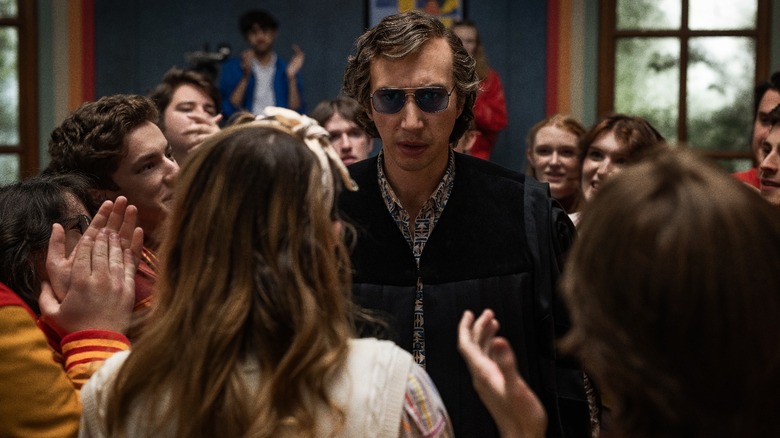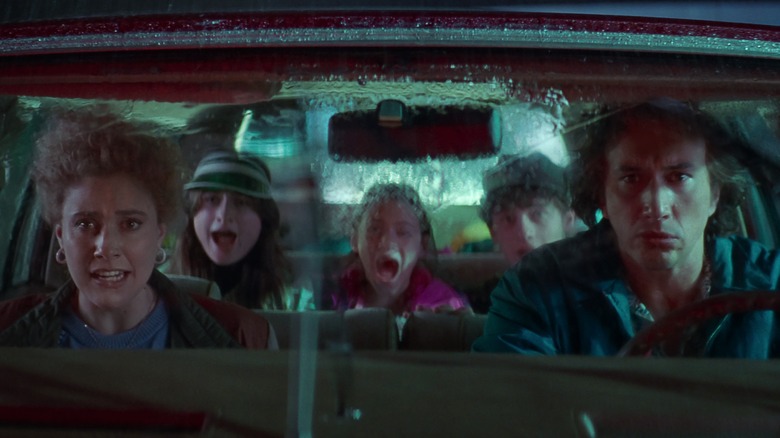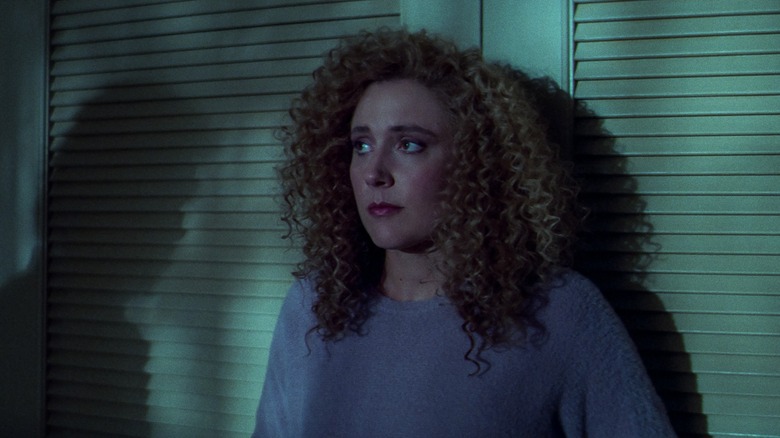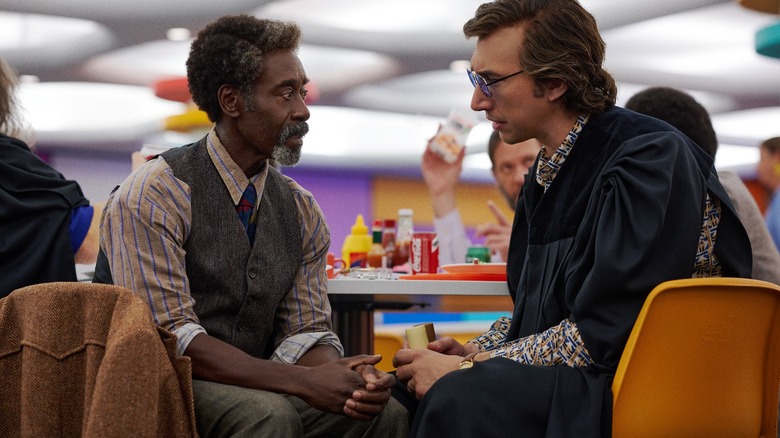White Noise Ending Explained: All Plots Tend To Move Deathward
In Don DeLillo's pivotal postmodern classic, "White Noise," professor Jack Gladney contemplates the inevitability of death, musing, "All plots tend to move deathward. This is the nature of plots ... We edge nearer death every time we plot. It is like a contract that all must sign, the plotters as well as those who are the targets of the plot." As a novel that functions as the cornerstone of postmodern literature, "White Noise" situates death anxieties at the heart of its remarkably absurdist core, a theme that is interconnected with late-20th century socio-political and cultural shifts, including rampant consumerism and the obsession with television screens. DeLillo's novel is pretty heavy and saturated with too many themes, and a film adaptation of such a tonally wild text is as tricky as it gets.
Director Noah Baumbach rose to the challenge and created a faithful reflection of DeLillo's world in his "White Noise," with an ending that morphs into a musical outro number at the supermarket, a key setting in the world of the novel and the film. While DeLillo's book obviously does not end with a musical number, the film distills the essence of Jack Gladney's (played by Adam Driver) mindscape towards the end of the novel. As Gladney's perspective functions as the vehicle for commentary, the film ends with a definitive message about the various kinds of white noise we consume to distract ourselves from the visceral human fears we bury deep within.
The ending of Baumbach's "White Noise" can be confusing, as it does not directly answer questions or etch a natural conclusion to a story about the Gladneys, who experience near-death after an environmental disaster grips their town. To make better sense of the ending, let's break down the themes that linger throughout the film.
What to remember about White Noise
Throughout the three sections "White Noise" is split into, Jack constantly muses over his relationship with mortality and worries about the effects such fears might have on his family. His wife, Babette (Greta Gerwig), is later revealed to be taking drugs to deal with her anxieties surrounding death, which are exacerbated after the Airborne Toxic Event that releases chemical gas in the atmosphere of their town. While Babette and the children in the family manage to quarantine themselves during the environmental disaster, Jack is exposed to the chemical gas, which induces terrifying hallucinations about a man following him to lead him to his impending death.
To understand the crux of Jack's psyche, one must contrast his perception of the world before and after the Airborne Toxic Event. Despite being an academic who thinks and speaks in deeply philosophical terms, Jack fails to acknowledge that the omnipresence of the television, which feeds us catastrophes daily, creates an unwitting distance between the spectator and the broadcasted victims of such disasters. After Jack gets exposed to the gas, his immediate response is denial, peppered with a sense of entitlement: He reasons that he's an esteemed academic, and such disasters should not happen to someone like him.
After all, the catastrophes that he witnesses on TV cannot happen to someone like him, as he is used to being a desensitized onlooker instead of someone being broadcasted about during a catastrophe. No amount of bargaining, however, can change the fact that the illusion has been broken and that his white noise has been silenced for a moment, exposing the fragility of existence and the arbitrary nature of disaster. This confrontation with reality is deeply unpleasant, leading Jack and Babette to act in ways that are rather extreme.
Mortality haunts us all
Towards the end, right before the concluding grocery store sequence, Jack learns that Babette is sleeping with a man named Mr. Gray in exchange for Dylar, experimental pills that suppress anxieties surrounding death. As Babette was already prone to substance abuse prior to the disaster due to a latent fear of death, the catastrophe intensifies this tendency and propels her to take such drastic measures. Jack's attempt to shoot Mr. Gray in a fit of revenge is more of a manifestation of his desire to best, or cheat death; as Mr. Gray is the same man he is hounded by in his chemical exposure-induced hallucinations, he wishes to exercise control over his fate by "killing" him.
Both DeLillo's novel and Baumbach's plot zeroes in on the myth of American suburbia and the repercussions on the family unit once such an idyllic concept is torn apart by reality. While death is the ultimate fear that bangs the gavel of finality, other fears haunt us throughout life. The fear of monotony, where the death of daily routines urges us to seek stimulation. The fear of never measuring up to what we want our legacies to entail. The fear of our deaths being utterly insignificant. While Babette resorts to drugs to forget such deep-seated fears, Jack takes the existential route and acknowledges it, but is never able to truly embrace this inevitability or harbor a Sisyphean zest for life.
Baumbach dramatizes the distractions we build for ourselves to deny such fears via his ending: Lines and lines of products at the grocery store are meant to keep us occupied, to the point that our very identities are linked to what we buy and consume. The grocery store is a spiritual safe haven, albeit a hollow one.
A multi-pronged critique
Apart from critiquing postmodern consumerism, DeLillo and Baumbach satirize academia and the intellectual fallacies inherent within it. Jack's area of expertise, Hitler Studies, is a special field spearheaded by him, although it is never explained why he's so entranced by this hyperspecific subject matter when it can easily be understood within a wider context. Jack's Hitler Studies, much like his colleague Murray Siskind's (Don Cheadle) Elvis Studies, denotes the academic tendency to compartmentalize our understanding of culture to make it more palatable for a society that thrives on bite-sized pieces of media that often do not exceed 30 seconds.
Speaking of a culture that arbitrarily hyperfixates, the supermarket emerges as a hyperreal space that allows us to lose ourselves in a world with countless mini-escape routes. Apart from being a fantastical space, it lets us hone our identities and how we are perceived, be it in the form of the products we use to enhance our features or the lifestyles we sport to project a certain aesthetic. As Jack says, "Everything we need that is not food or love is here in the tabloid racks." Even after experiencing something as disorienting as a chemical disaster, everyone has forced themselves back into "normalcy" by burying their fears and desires deep within.
The assembly line of fresh escapes awaits, lulling us into white noise of various kinds: The quiet hum of technology that we are hyper-dependent on, the noise on our screens we desperately consume, and the silent blaring of targeted advertisements that subconsciously program our lives. In the end, we are only human, terrified of the inevitable to the point that any and all distractions are welcome. The white noise must continue to deafen us until it drowns any and all thoughts of an existential nature.



